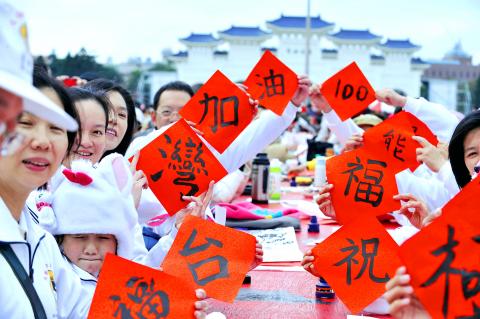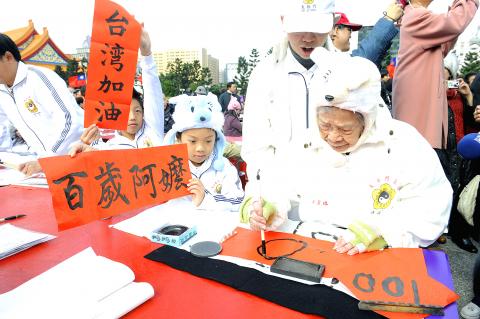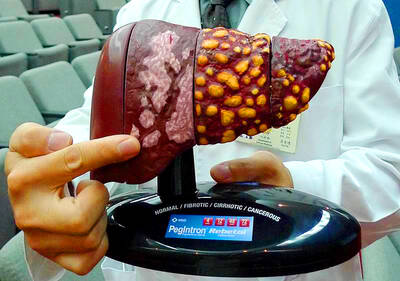Undaunted by a cold front that brought one of the coldest New Year’s Days in years to Taiwan, tens of thousands of people swarmed the Presidential Office plaza yesterday morning to attend the annual national flag-raising ceremony, as celebrations marking the Republic of China’s (ROC) centenary got under way.
Wu Sui-yun, 43, who attended the flag-raising ceremony for the first time, said she got up before daybreak because this year marks the 100th anniversary of the ROC, and she wanted to mark the historic moment.
Mohandi, a 50-year-old man from Egypt who has lived in Taiwan for 25 years, said he did not sleep at all last night in order to attend the ceremony.

PHOTO: CNA
“I love Taiwan. This is a very special event, a once-in-a-lifetime experience,” he said.
At the ceremony, a new arrangement of the national anthem made its debut, and several video clips showcasing the history and the people of the country, from a picture of Sun Yat-sen (孫逸仙) establishing the ROC on Jan. 1, 1912, to the winning of an international award by world champion Master Chef Wu Pao-chun (吳寶春).
One of the highlights of yesterday’s flag-raising ceremony occurred when 100 couples appeared on stage to get married in a mass wedding, which was held for the first time during the annual event.

Photo: George Tsorng, Taipei Times
President Ma Ying-jeou (馬英九), who participated in the ceremony with first lady Chow Mei-ching (周美青), told the crowd he has attended the flag raising many times before, but it felt completely different this year.
“It’s a milestone for the Republic of China. Dr Sun Yat-sen ended 5,000 years of monarchy and founded the ROC on Jan. 1, 1912. One hundred years later, we have turned into the most democratic, diverse, educated and prosperous [Chinese] society in history,” Ma said.
According to the Republic of China (Taiwan) Centenary Foundation, about 70,000 people attended the flag-raising ceremony this year.
Later yesterday, thousands of people attended the annual calligraphy festival in Taipei, where Ma wrote a Chinese character to wish good fortune for the country.
Writing the character tai (泰, or prosperity) on a piece of red paper with ink and a brush, Ma said he hoped the new year would mark the end of extreme adversity and the beginning of prosperity.
The annual event, held on the square of the Chiang Kai-shek Memorial Hall, was initiated by Ma in 2005 when he was Taipei mayor.
While those who live in the ROC will continue to read and write traditional Chinese, Ma said, he hoped Chinese living in China would learn to read traditional Chinese characters while writing simplified script so they would be able to better connect with the Chinese culture.
“It is purely cultural; there is nothing political about it,” he said.
Ma was among the 12 guests invited by the organizer to write down auspicious words and usher in the Year of the Rabbit. Among them, Premier Wu Den-yih (吳敦義) wrote an (安, or stability), -Legislative Speaker Wang Jin-pyng (王金平) wrote ho (和, or peace) and Taipei Mayor Hau Lung-bin (郝龍斌) wrote hau (好, or good).
Chen Yeh Tsai-mei (陳葉再妹), who does not read or write Chinese, drew the number 100 to celebrate the centennial of the ROC, while wearing a rabbit-shaped hat. The 100-year-old great grandmother speaks only Hakka and Hoklo (commonly known as Taiwanese). It was the second time she has attended the event.

The Taipei Summer Festival is to begin tomorrow at Dadaocheng Wharf (大稻埕), featuring four themed firework shows and five live music performances throughout the month, the Taipei Department of Information and Tourism said today. The festival in the city’s Datong District (大同) is to run until Aug. 30, holding firework displays on Wednesdays and the final Saturday of the event. The first show is scheduled for tomorrow, followed by Aug. 13, 20 and 30. To celebrate the 30th anniversary of Disney Pixar's movie Toy Story, the festival has partnered with Walt Disney Co (Taiwan) to host a special themed area on

Aftershocks from a magnitude 6.2 earthquake that struck off Yilan County at 3:45pm yesterday could reach a magnitude of 5 to 5.5, the Central Weather Administration (CWA) said. Seismological Center technical officer Chiu Chun-ta (邱俊達) told a news conference that the epicenter of the temblor was more than 100km from Taiwan. Although predicted to measure between magnitude 5 and 5.5, the aftershocks would reach an intensity of 1 on Taiwan’s 7-tier scale, which gauges the actual effect of an earthquake, he said. The earthquake lasted longer in Taipei because the city is in a basin, he said. The quake’s epicenter was about 128.9km east-southeast

BE CAREFUL: The virus rarely causes severe illness or death, but newborns, older people and those with medical conditions are at risk of more severe illness As more than 7,000 cases of chikungunya fever have been reported in China’s Guangdong Province this year, including 2,892 new cases last week, the Centers for Disease Control (CDC) yesterday said it is monitoring the situation and considering raising the travel notice level, which might be announced today. The CDC issued a level 1 travel notice, or “watch,” for Guangdong Province on July 22, citing an outbreak in Foshan, a manufacturing hub in the south of the province, that was reported early last month. Between July 27 and Saturday, the province reported 2,892 new cases of chikungunya, reaching a total of 7,716

STAY VIGILANT: People should reduce the risk of chronic liver inflammation by avoiding excessive alcohol consumption, smoking and eating pickled foods, the physician said A doctor last week urged people to look for five key warning signs of acute liver failure after popular producer-turned-entertainer Shen Yu-lin (沈玉琳) was reportedly admitted to an intensive care unit for fulminant hepatitis. Fulminant hepatitis is the rapid and massive death of liver cells, impairing the organ’s detoxification, metabolic, protein synthesis and bile production functions, which if left untreated has a mortality rate as high as 80 percent, according to the Web site of Advancing Clinical Treatment of Liver Disease, an international organization focused on liver disease prevention and treatment. People with hepatitis B or C are at higher risk of